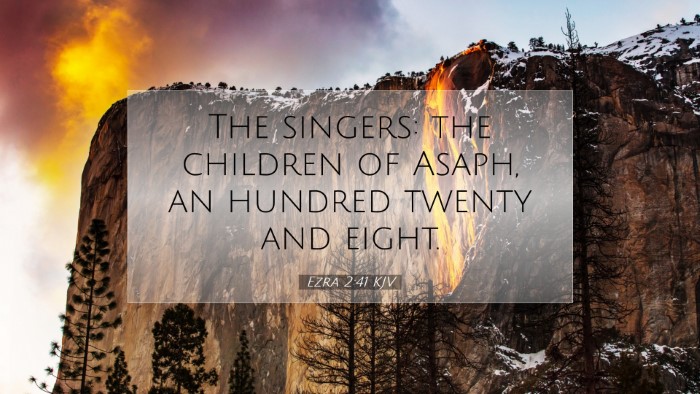Commentary on Ezra 2:41
This verse presents a vital aspect of the return of the Israelites to Jerusalem after their Babylonian captivity. Here, Ezra documents the various families and groups that returned with Zerubbabel, highlighting their roles and significance in the restoration of the Temple.
Text of Ezra 2:41
The singers: the children of Asaph, an hundred twenty and eight.
Overview
Ezra 2:41 specifically mentions the singers who were part of the returnees from Babylon. The number of singers is significant, as it reflects the importance of music and worship in the rebuilding of Jerusalem. Music, especially the singing of psalms, served both as a means of worship and a way to maintain the community’s identity.
Significance of Singers
Matthew Henry comments on the importance of the singers in the context of worship and community. In ancient Israel, singing played an essential role in worship, particularly in the Temple. The presence of the singers shows a return to the established order of worship, which was vital for the spiritual life of the nation.
Albert Barnes emphasizes that the children of Asaph were particularly noted for their role in the Temple music. This lineage links them to David's organized music ministry, thereby connecting the history of Israel’s worship to the present restoration. Restoring the singers was integral for revitalizing worship in the post-exilic community.
The Number of Singers
The mention of “an hundred twenty and eight” provides a specific number, which symbolizes completeness and order in the returning community. Adam Clarke notes that the number might also reflect the size of the community’s commitment to worship. A large group of singers indicates a healthy religious dedication among the returnees.
The Role of the Children of Asaph
- Historical Context: The sons of Asaph are noted throughout the Scriptures for their contributions to the worship services, especially in 1 Chronicles 6:31-48, where their role in the music ministry is established.
- Cultural Significance: Their presence indicates a revival of the tradition of worship as established under King David, which included specific families dedicated to the art of music and song in the Temple.
- Theological Implication: The return of these individuals serves as a reminder of God's faithfulness to Israel and His promises to restore the nation post-exile, fostering a sense of continuity in God’s covenant with His people.
Theological Themes
The gathering of the singers reflects themes of restoration and renewal central to the book of Ezra. This return to a structured worship life signifies a turning point where the people, after years of dislocation, reestablish their religious and cultural identity.
Worship and Identity
Worship such as singing has the potential to unify and rejuvenate a community. The collective act of singing can be seen as a powerful declaration of faith. The community’s identity is affirmed through their songs, as they sing of their history, their hardships, and their hope in God’s promises.
Implications for Modern Worship
In contemporary settings, the role of music within the church mirrors that of the singers in Ezra’s time. It underscores the need for careful consideration of worship styles, the selection of worship leaders, and the involvement of the congregation in glorifying God. Pastors and worship leaders can glean valuable lessons from the structure and dedication of the singing groups in Ezra 2:41.
Application for Today
- Encouragement for Worship Leaders: Modern worship leaders can take inspiration from the commitment of those returning singers, recognizing their vital role in leading congregational worship.
- Understanding Community Dynamics: The gathering of singers illustrates that worship is not a solitary act but a communal one, which can encourage pastors and leaders to foster community rather than isolation in church settings.
- Focus on Continuity: Just as the singers were rooted in tradition, currently worship also needs to respect and build on its historical foundations while being open to the Holy Spirit's guidance for new expressions of worship.
Conclusion
In summary, Ezra 2:41 serves as a powerful reminder of the importance of worship in the life of God’s people. The return of the singers signifies both a historical and spiritual renewal that was essential for the revitalization of Israel’s worship practices after exile. For pastors, students, and theologians, this verse emphasizes both the historical continuity of worship and its transformative power in community life, encouraging them to reflect on the role of music and collective worship in nurturing faith and identity.


